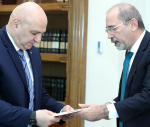You are here
The divide over the Bahrain conference
Jun 15,2019 - Last updated at Jun 15,2019
The ongoing debate about whether to attend the Bahrain conference on the economic development of the Palestinians and their territories reminds me of the controversy that ensued after the adoption of the Universal Declaration of Human Rights on December 10, 1948.
The international community wanted then to codify the declaration into a legally-binding instrument but was divided on whether to give priority to civil and political rights first or to economic, social and cultural rights.
The Western world insisted on giving priority to civil and political rights, while the socialist countries, led then by the USSR, wanted to give prominence to economic, social and cultural rights.
The West argued that there can be no development without the foundation of political rights and democracy, while the Moscow-led nations argued that there can be no political rights without the foundation of economic and social development.
The sterile debate ended when the two sides decided on the adoption of two separate human rights covenants; one on economic, social and cultural rights, and the other on civil and political rights.
In retrospect, both schools of thought were right because the two sets of rights complement one another and cannot be pursued in isolation from one another. Against this backdrop, the current divide between whether to proceed with economic rights of the Palestinians first or with their political rights first is academic and would not make much difference at the end of the day.
The Palestinians and their Arab supporters do not really have the luxury of choosing which route to take first, as the political path is still blocked and not available. The Palestinians are still waiting for the right political avenue to settle their conflict with Israel based on the two-state solution, but it is not yet available to them.
From the looks of things, the political solution remains elusive to say the least. Against this backdrop, would not it be more prudent for the Palestinians to knock at the door that is open and available to them instead of waiting indefinitely for the political door to open up?












